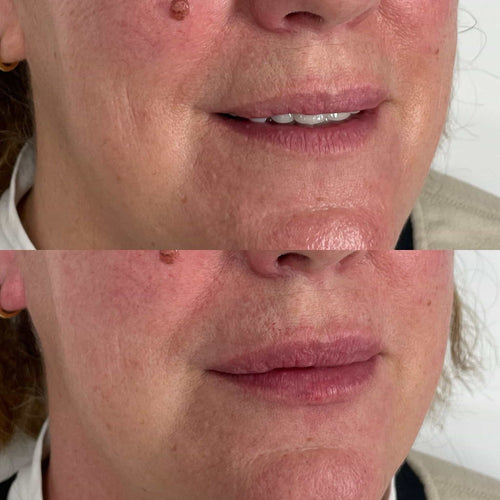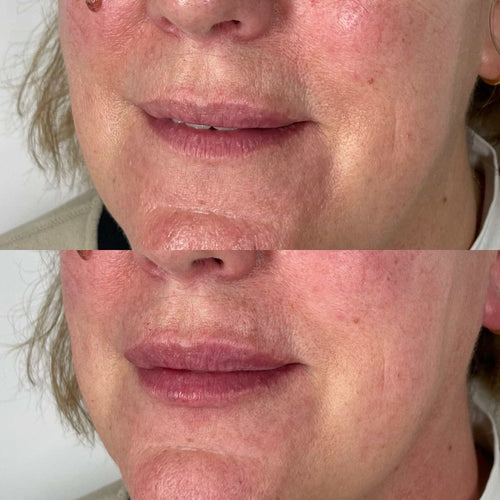Arrange a Dermal Filler Consultation at It’s Me and You Clinic with Dr. Laura Geige
Pregnancy and Breastfeeding
Hormonal Fluctuations
Pregnancy and breastfeeding are unique physiological states characterized by significant hormonal fluctuations. These changes can impact the body’s response to various treatments, including dermal fillers.
During pregnancy, estrogen and progesterone levels surge dramatically. These hormones influence collagen synthesis, skin elasticity, and blood flow. Dermal fillers are primarily designed to augment and reshape facial tissues by stimulating collagen production. However, the hormonal environment of pregnancy can make it unpredictable how a person’s body will react to these substances.
Additionally, during pregnancy, there is increased risk of blood clotting, and dermal filler injections could potentially increase this risk. Furthermore, the long-term effects of fillers on a developing fetus are unknown.

Breastfeeding further complicates the picture. While some medications may pass into breast milk in trace amounts, the safety of dermal fillers during breastfeeding is not well established. There’s a potential risk of the filler components being transferred to the infant through breast milk, with unknown consequences.
In light of these considerations, it is generally recommended that individuals who are pregnant or breastfeeding avoid dermal fillers until after they have completed both stages. This allows for the body to stabilize hormonally and ensures the safety of both mother and child.
Potential Risks to Baby
Pregnancy and breastfeeding are significant periods in a woman’s life where her body undergoes profound changes to support the developing fetus or nursing infant.
During these times, it is crucial to exercise extra caution when considering any medical procedures, including dermal fillers.
While dermal fillers are generally considered safe for healthy adults, their use during pregnancy and breastfeeding presents potential risks that warrant careful consideration.
**Pregnancy**: The developing fetus is particularly susceptible to the effects of foreign substances, and the safety of certain fillers during pregnancy has not been definitively established.
Some ingredients in dermal fillers may cross the placenta and potentially harm the fetus, leading to developmental problems or other complications.
Furthermore, **hormonal changes** during pregnancy can alter the body’s response to fillers, increasing the risk of complications such as uneven distribution, swelling, or bruising.

**Breastfeeding**: The transfer of filler ingredients through breast milk to the nursing infant is a concern. Although limited research is available on this specific topic, it is advisable to err on the side of caution and avoid fillers during breastfeeding.
Any potential risks to the infant cannot be fully ruled out.
It is essential for women who are pregnant or breastfeeding to consult with their healthcare provider before considering dermal fillers.
The doctor can assess individual risk factors and provide personalized advice based on the specific type of filler, ingredients, and the stage of pregnancy or lactation.
Individuals with Certain Medical Conditions
Autoimmune Disorders
Individuals with certain medical conditions and autoimmune disorders may be at increased risk for complications from dermal fillers. It’s crucial to consult with a qualified healthcare professional to assess individual suitability for treatment.
Here are some medical conditions and autoimmune disorders that may raise concerns regarding dermal filler safety:
Skin Conditions:
– **Active acne or infections:** Dermal fillers can exacerbate these conditions. It’s best to address the underlying skin issue first.
– **Eczema or psoriasis:** These inflammatory skin conditions may increase the risk of allergic reactions or complications.
Autoimmune Disorders:
– **Systemic lupus erythematosus (lupus):** Lupus can cause widespread inflammation and affect blood clotting, potentially leading to serious complications from fillers.
– **Rheumatoid arthritis:** Similar to lupus, rheumatoid arthritis increases the risk of inflammatory reactions and other complications.
– **Scleroderma:** This condition involves hardening of the skin and connective tissues, making it more difficult for fillers to integrate properly and increasing the risk of vascular problems.
Other Medical Conditions:**
– **Diabetes:** Individuals with diabetes may have impaired wound healing and a higher risk of infection.
– **Blood clotting disorders:** These conditions increase the risk of bruising and bleeding complications.
– **Uncontrolled hypertension (high blood pressure):
High blood pressure can lead to vascular problems, including those associated with fillers.
Important Notes:**
– This list is not exhaustive.
– It’s crucial for individuals with any medical condition, even if it’s not listed here, to discuss their suitability for dermal fillers with a qualified healthcare professional.
– A thorough medical history and physical exam are essential to determine if dermal fillers are safe and appropriate.
Bleeding Disorders
Individuals with certain medical conditions should exercise extreme caution when considering dermal filler treatments.
Bleeding disorders are a significant concern.
Dermal fillers often involve injections, which can increase the risk of bleeding in individuals prone to blood clotting issues.
This can lead to bruising, hematomas (collections of blood under the skin), and other complications that may affect the filler’s placement and longevity.
It’s crucial for anyone with a history of bleeding disorders or taking medications that affect blood coagulation to consult with a qualified medical professional before undergoing dermal filler procedures.
They can assess the individual’s specific condition and risks, and may recommend alternative treatment options or suggest modifications to the procedure to minimize potential complications.
Skin Infections
Individuals with certain medical conditions and active skin infections should avoid dermal fillers.
Certain medical conditions can increase the risk of complications from dermal fillers, such as:
– Autoimmune diseases:** People with autoimmune diseases, such as lupus or scleroderma, have a compromised immune system that may react negatively to the filler material.
– Bleeding disorders:** Individuals with bleeding disorders, such as hemophilia, are at an increased risk of bruising and bleeding after injections.
– Uncontrolled diabetes:** Diabetes can impair wound healing, making it more difficult for the skin to recover from injection sites.
– Certain types of cancer:** Some types of cancer or recent cancer treatment may make individuals ineligible for dermal fillers.
Active skin infections are also a major contraindication for dermal fillers.
Injections into infected areas can spread the infection and worsen its severity. It’s crucial to address any active skin infections, such as:
– Bacterial or viral skin infections:** These infections require medical treatment before considering dermal fillers.
– Fungal infections:** Fungal infections may also increase the risk of complications and should be treated before filler injections.
It’s essential to consult with a qualified medical professional, such as a board-certified dermatologist or plastic surgeon, to determine if you are a suitable candidate for dermal fillers. They will evaluate your medical history, skin condition, and any potential risks or contraindications.
People Taking Specific Medications
Blood Thinners
Individuals taking specific medications, particularly blood thinners, need to exercise caution when considering dermal filler injections.
Blood thinners work by preventing blood clotting, which is crucial for wound healing. Dermal fillers often involve injecting substances into the skin’s deeper layers, and any minor bleeding at the injection site could become problematic in individuals taking these medications.
The risk of excessive bruising or bleeding after filler injections increases significantly for people on anticoagulants like warfarin (Coumadin), heparin, aspirin, clopidogrel (Plavix), or other antiplatelet drugs.
While some individuals taking these medications might still be suitable candidates for dermal fillers with careful consideration and monitoring by a qualified medical professional, it’s generally advisable to avoid them.
Before undergoing any cosmetic procedure involving injections, it is essential to consult with your doctor or dermatologist.
They will assess your individual medical history, current medications, and overall health to determine if dermal fillers are safe for you.
If you are taking blood thinners, be prepared to discuss alternative treatments or strategies with your doctor.
Retinoids
Dermal fillers are a popular cosmetic procedure used to add volume and fullness to various parts of the face, such as the lips, cheeks, and under-eye area. However, certain medications can affect how the body responds to fillers, increasing the risk of complications or diminishing the desired results.
Individuals taking specific medications should exercise caution before undergoing dermal filler treatments. Here’s a breakdown of some key medication categories and their potential implications:
1. Blood Thinners (Anticoagulants):
-
Medications like warfarin (Coumadin), heparin, aspirin, and clopidogrel (Plavix) can increase bleeding risk. This can lead to excessive bruising, swelling, or even hematomas (blood clots under the skin) after filler injection.
-
In some cases, a doctor might adjust dosage or temporarily discontinue blood thinners before filler treatment, but this should only be done under strict medical supervision.
Book a Dermal Filler Appointment with Dr. Laura Geige Today
2. Retinoids (Vitamin A Derivatives):
-
Topical retinoids like tretinoin (Retin-A) or oral retinoids like isotretinoin (Accutane) can thin the skin and make it more susceptible to bruising.
-
It’s generally recommended to avoid filler injections while using retinoids, as this can increase the risk of complications. Depending on the specific retinoid and its strength, your doctor might suggest temporarily pausing use before treatment.
3. Immunosuppressants:
-
Drugs that suppress the immune system, such as corticosteroids or cyclosporine, can increase the risk of infection at the injection site.
-
It’s important to inform your doctor about any immunosuppressants you are taking so they can assess the potential risks and benefits of filler treatment.
4. Antibiotics:
-
Certain antibiotics, like doxycycline, can interfere with collagen production, potentially affecting the longevity and effectiveness of dermal fillers.
Reserve a Consultation for Dermal Fillers with Dr. Laura Geige
**It’s crucial to have a thorough consultation with a qualified and experienced dermatologist or plastic surgeon before undergoing any dermal filler procedure.
During this consultation, be sure to disclose all medications you are currently taking, including supplements and herbal remedies. This will allow your doctor to make an informed decision about whether dermal fillers are safe and appropriate for you.
Antibiotics
Individuals taking certain medications should exercise caution before undergoing dermal filler treatments.
Blood thinners, such as warfarin and aspirin, can increase the risk of bleeding and bruising at the injection sites.
Antibiotics, particularly those that are immunosuppressants, may also interfere with the body’s ability to heal properly after the procedure.
It’s crucial for potential patients to consult with their doctor or dermatologist before receiving dermal fillers if they are taking any medications, including over-the-counter drugs and herbal supplements.
The healthcare provider can assess individual medical histories, current medications, and overall health status to determine the risks and benefits of dermal fillers in each case.
In some instances, the doctor may recommend adjusting medication dosages or temporarily discontinuing certain medications before the procedure to minimize potential complications.
Open communication between patients and their healthcare providers is essential for ensuring safe and effective treatment outcomes.
The Lady London Crimson Hill Cotswold House Hotel Your Relationship Edge Melissa J Design Create Cocktails at Home
- Who Should Not Get Dermal Fillers? - December 21, 2024
- How Does Lip Filler Feel - December 14, 2024

